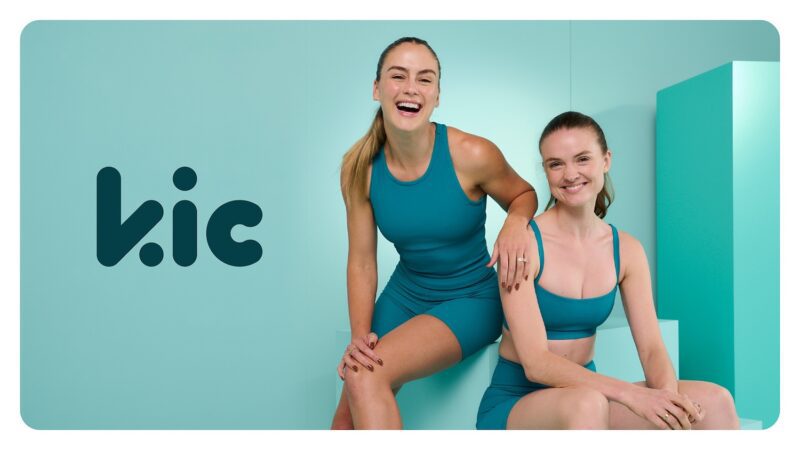What began in 2015 as Keep it Cleaner – a simple recipe book by two former model friends – has transformed into a global wellness brand with over 2.5 million community members worldwide and an app downloaded more than 750,000 times.
A community I am now proudly a member of. But that wasn’t aways the case.
I subscribed to Keep it Cleaner in 2018 when the app first launched, then drifted away for a while due to the problematic nature of “clean eating” until more recently, when I became a regular podcast listener. This call-back to their brand wasn’t by accident, and certainly wasn’t driven by a name change – it all came down to their refreshed new messaging.
The Kic rebrand shows that while a change to your name and visual identity may mark a turning point in your brand journey, it’s the refreshed messaging, along with smart, intentional, and audience-lead decisions, that does the heavy lifting when it comes to keeping brands relevant and loved in an ever-changing market.
Recognising the Cultural Shift
When Keep It Cleaner first launched, the wellness industry was still riding the tail-end of the toxic diet culture of the early 2000s. “Clean” eating was more than just rinsing your vegetables – it was code for restriction and unattainable ideals which at the time were seen as the gold standard and the best way to pursue health.
As 2020 approached, the conversation had shifted. The body positivity movement was gaining traction, and people were seeking a more holistic, inclusive definition of health.
In the same year that Taryn Brumfitt was named Australian of the Year for her body positive advocacy, the brand officially rebranded, dropping the problematic Cleaner for the double meaning abbreviation used by their community – Kic.
However the real transformation came through a complete overhaul of brand personality and messaging.
Kicking Diet Culture to the Curb
While a new name and look signalled a major shift for the business, it was through carefully crafted copy, and an integrated campaign, that the rebrand truly took shape.
Their brand personality evolved from their earnest and energetic early days to a confident, inclusive, and purpose-driven brand, reflecting a deeper commitment to authenticity, body positivity, and holistic wellness.
The “KIC THE RULES” campaign, which launched to coincide with the brand evolution, was a pivot point for the organisation. Kic was no longer an app used to simply get fit and skinny, it was a celebration of prioritising yourself through exercise, meditation, wellness and nourishing food.
Brand touch-points were quickly expanded. The app launched meditation plans, recovery and mental health programs, more balanced recipes and a “Couch To 5K” inspired running program, while their Facebook group community began to shift too – prioritising support and encouragement across lifestyle topics over weight loss.
Kic also used a campaign pledge to match up to $10,000 in donations to the Butterfly Foundation, and launched merchandise where 100% of profits went to helping the organisation support those dealing with eating disorders.
The campaign, activations and donations created moments which were carefully placed with national media outlets and were strategically rolled out across their social media channels.
And this messaging has paid off, with sign-ups sky rocketing and fresh, perfectly-aligned brand partnerships including New Balance, Dineamic and, most recently, Sheet Society for their new Kic Rest Club.
This is a bold brand repositioning that has paid off. By rejecting the “before and after” culture, Kic has aligned itself with values their audience deeply care about, and in turn has connected in a way they were never able to before.
Building Founders as Brand Champions
Diet culture isn’t the only thing going out of style – the “girlboss” archetype has also faded over the past few years.
The post-COVID social influencer no longer presents a perfect life and zero flaws. Instead, we demand authenticity and the opportunity to share in not just the highs, but also the very relatable lows of our brand founders and influencers.
This was true for Kic founders Steph Clare Smith and Laura Henshaw, who along with the existing Kic brands, boast a combined social media reach of over 2 million people. As one of their biggest communication tools, a key part of the brand refresh was their repositioning to reflect community expectations and their new brand ethos.
Stepping into the CEO role just before the brand launch, Henshaw’s public image evolved from an enthusiastic and youthful entrepreneur, to a genuine, thoughtful, and purpose-led leader.
Alongside profiles in the Australian Financial Review and the Age, where she has been celebrated for Kic’s commercial success, she has featured heavily on high profile podcasts where she shares her body positivity journey, her advocacy for women and personal vulnerabilities, which has allowed her to connect more to her community than ever before.
As she told Mumbrella, “I’ve had social media now for more than ten years, and any time I have diverted from who I am and my truth, my social audience hasn’t grown, and things haven’t worked as well as they did before. I’m so grateful that my personal brand has grown by connecting with people through vulnerability and being myself.”
For Smith, she shared her journey of becoming a parent, including the challenges of finding time to prioritise yourself when caring for others. The Kic Bump brand now includes programs for pre and post natal, and the podcast offers a no-holds-barred perspective on parenthood.
The Takeaways
Kic’s success offers a few clear lessons:
- A brand is more than a logo – The real repositioning of Kic came through clear brand messaging which acted as the compass for all other activities.
- Read the cultural room – They identified early that diet culture was on the way out and made a bold, public pivot.
- Back up words with action – Their anti-diet stance was reinforced through tangible partnerships and donations.
- Let your audience lead – They adopted the name their community had already chosen for them.
- Evolve with authenticity – As the founders matured, the brand matured too, maintaining a human connection at every stage.


